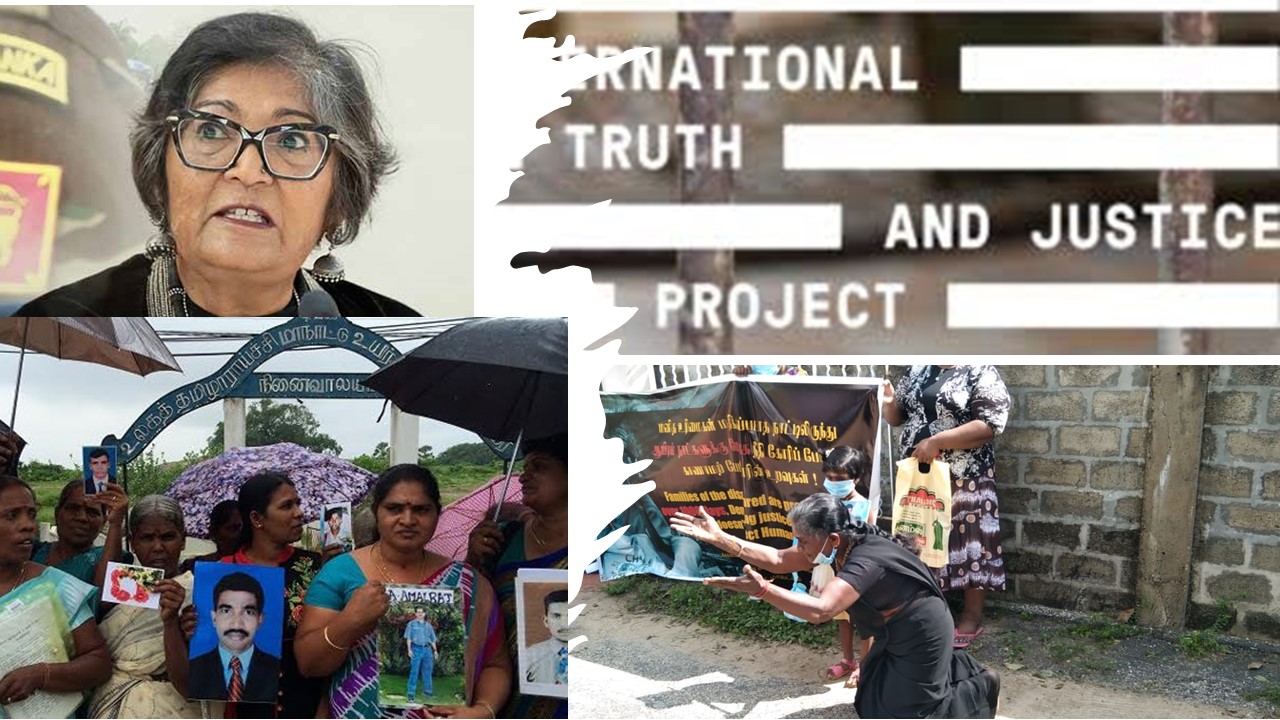More than 60 Sri Lankans, including military officials, have been included in a list submitted by the International Truth and Justice Project (ITJP) seeking sanctions and travel bans for human rights and economic crimes in the country and multiple universal jurisdiction cases.
The submissions have been sent to the governments of the United States, United Kingdom, Australia, and Canada as well as the European Union and the United Nations, the ITJP said in a statement.
“In the absence of any criminal accountability to date, it is vital to continue to document past and current crimes, analyse the evidence and use every channel to keep on asserting the truth,” Yasmin Sooka, executive director of ITJP said.
“We hope the new government in the UK will sanction Sri Lankans on Human Rights Day this year (10 December) for their alleged role in war crimes during the end of the country’s conflict,” she said.
The ITJP said the submissions covered gross violations of human rights and significant corruption in respect of the Sri Lankan army, navy, air force, police and intelligence officials, Tamil paramilitaries, as well as civil servants including judges and former ministers.
However, the South Africa-based independent, international, non-profit organisation, did not mention the names of the officials and people in its submission list.
WAR CRIMES
“The gross human rights violations and atrocity crimes include extrajudicial killings, enforced disappearance, arbitrary arrest and detention, torture, and various forms of sexual violence, perpetrated both during and after the civil war,” ITJP, the organization established in 2013 to promote justice and accountability in Sri Lanka, said in the statement.
“These range from attacks against civilians that may amount to serious international crimes, including war crimes and crimes against humanity.”
“In addition, the focus is on significant corruption which is structurally embedded in Sri Lankan governance and public institutions which encompasses undue interference with judicial processes that further sets back accountability efforts for underlying human rights violations, as well as abuses of power.”
The United Nations Human Rights Council (UNHRC) passed a resolution in March 2021 that has given a mandate for the global body to establish a mechanism to gather evidence outside the country over alleged human rights violations during and after a 26-year war that ended in 2009.
The resolution has allowed the Office of the UN High Commissioner for Human Rights (OHCHR) “to collect, consolidate, analyse and preserve information and evidence and to develop possible strategies for future accountability processes for gross violations of human rights or serious violations of international humanitarian law in Sri Lanka.
It is also expected to advocate for victims and survivors, and to support relevant judicial and other proceedings, including in the member states, “with competent jurisdiction”.
A Sectoral Oversight Committee on National Security in the last parliament summoned representatives of the country’s Foreign Ministry, Defence Ministry, chief of all three forces, and attorney general to review external mechanisms that have been established as per the UN resolution on evidence gathering mechanism.
The Committee has said in line with the mechanism, legal cases can be filed in different countries under international jurisdictions against the military leaders and those officials who gave orders to the military.
The committee expressed its concerns over any legal actions by various countries against those involved could lead to prosecute Sri Lanka’s military and political leaders at the International Court of Justice ( ICJ) and International Criminal Court (ICC).
Since the end of the war in 2009, Sri Lanka has strongly rejected any human rights violation and said it had maintained zero casualties in its final war.
However, ITJP said the submissions looked at state-owned enterprises and misappropriation of public funds that resulted in huge financial losses for the entire country, and contributed to the economic crisis in the country.
INDIANS ALSO INCLUDED
“Furthermore, visa ban requests have been made for a number of identified former Indian Peacekeeping Force officers alleged to have been complicit in gross human rights violations and mass atrocity crimes, in the period when deployed in Sri Lanka in the late eighties,” it said.
The ITJP has submitted lengthy sanctions dossiers on two former army chiefs – General Shavendra Silva in 2021 and General Jagath Jayasuriya in 2022 to the UK, as well as to the governments of Canada, Australia and the EU.
The US has imposed a travel ban on General Silva and his immediate family members, Navy intelligence officer Chandana Prasad Hettiarachchi, Army Staff Sergeant Sunil Ratnayake, army officer Prabath Bulathwatta, and former Navy chief Wasantha Karannagoda, citing human rights violations.
Travel bans have already been imposed on senior retired military leader Shagi Gallage and the former defence secretary Kamal Gunaratne as well, the previous government has admitted.
Canada last year imposed financial sanctions to freeze the assets of former Sri Lankan presidents Mahinda Rajapaksa and his brother Gotabaya Rajapaksa, citing rights abuses.
UNAWARE OF BAN
Some top Sri Lankan military officials have been deprived of taking part in lucrative UN Peacekeeping Missions due to human rights allegations during the war.
Human rights analysts say some Sri Lankan political and military leaders are still unaware that they have been blacklisted by Western nations for rights abuses and will only become aware of such measures when they request visas from these countries.
A Torture Victim Protection Act case was filed in the US against Gotabaya Rajapaksa in 2019 and a criminal complaint submitted in Singapore in 2022, the ITJP said.
“A further universal jurisdiction case is under investigation in an undisclosed jurisdiction against a retired senior member of the Sri Lankan Army. Additionally, two linked war crimes cases involving suspects from a Sri Lankan Tamil paramilitary group aligned to the military were referred to the UK’s Metropolitan Police which made two arrests and recently put out a public appeal for information.”
The Rajapaksas and military leaders have denied any wrongdoing, and successive governments have rejected an independent international investigation into alleged human rights violations, citing infringement on the country’s sovereignty.


